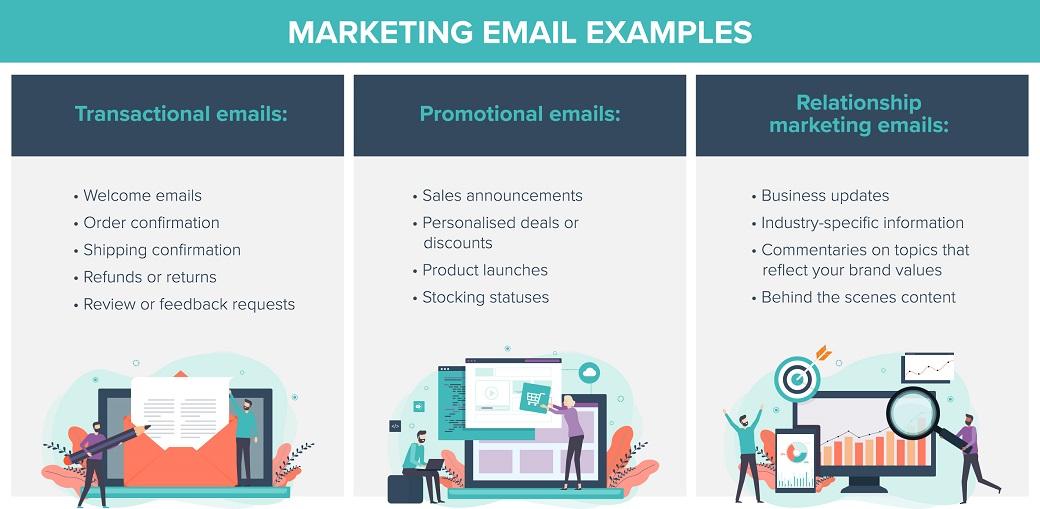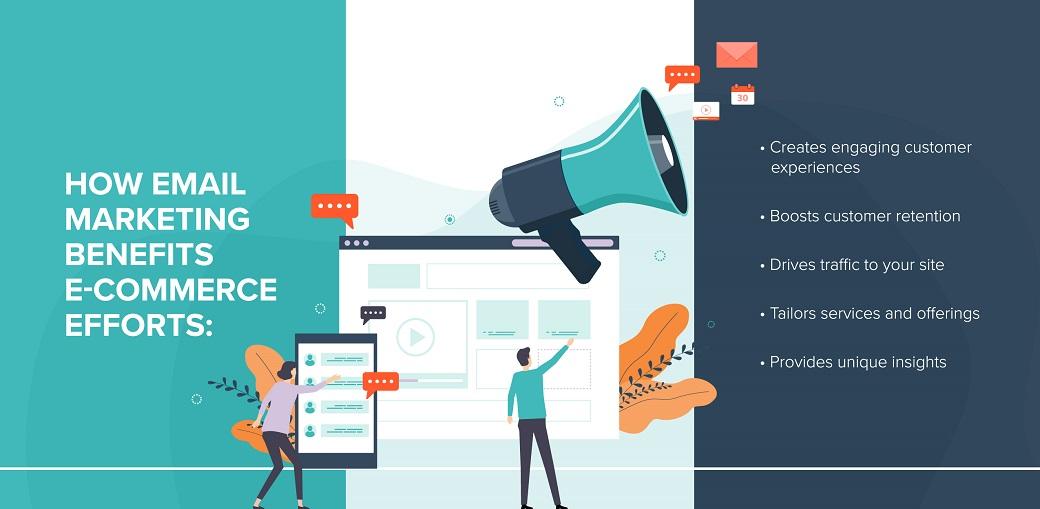When you’re running an e-commerce store, marketing is absolutely essential. It’s the main way to get word out about your business and drive traffic to your website. But it’s not just about securing new sales. A big part of marketing for e-commerce is about creating and developing a relationship with your customers – which is where email marketing comes in.
What is email marketing?
Email marketing involves communicating with your customers through email to generate more sales for your business. This includes targeted email campaigns that build on customer experience with your company. These emails can be customised to reflect purchasing habits or strengthen existing relationships.
Email marketing provides a personal touch
For small businesses, email marketing has the potential to be even more powerful thanks to personalisation. People like to shop at small businesses as they feel valued and get better customer service – email marketing can achieve that same feeling.
It’s a unique strategy because it gives you a direct line to your customers. Being able to reach out to your base, through promotions, business updates or order information means you can nurture the relationship you have with your customers – and retain them too.
Retention is better than acquisition
For small businesses, focusing on retaining customers is a much more effective solution – in terms of costs and resources. When it comes to the cost of winning sales, 82% of businesses agree that customer retention is cheaper than acquisition. For small businesses who don’t have access to infinite resources and funds, this can make all the difference to your profits.
The figures agree with this too – research shows that increasing customer retention by just 5% boosts profits by 25% - 95% and email marketing can get you there.
Plus, attracting new customers is a time-consuming process that isn’t guaranteed to pay off. Getting your customer acquisition strategy right requires a lot of detailed research into market segments and consumer buying habits – and doesn’t even take into account the huge competition you’re likely to face in the online world.
But focusing a portion of your marketing efforts on customer retention is a much more cost-and-time-effective choice.
Email marketing in practice
For small businesses that don’t have huge followings online or the resources to pay for prime advertising space, email marketing is a great way to create more sales by either:
- improving relationships with existing customers who’ve already purchased from your site or signed up to your emails.
- capturing customer emails in exchange for an introductory discount and establishing a relationship with them, known as list building.
Once you have customer’s contact information, you can implement different email marketing campaigns.
Email marketing strategies:
- transactional emails
- promotional emails
- relationship marketing emails.
Transactional emails
The first type of email that you’re likely to send customers are the ones regarding their order or account. Unlike in a physical store where customers can find, purchase and leave with their items in one trip, buying products online is a longer process. Once they click ‘buy now’, they don’t know if the order has gone through or is coming to them, unless the business they purchased from tells them.
Considering how important it is to keep customers in the loop about the process of their order, transactional emails include:
- welcome emails
- order confirmation
- shipping confirmation
- refunds or returns
- review or feedback requests.
Promotional emails
Aside from your customers’ orders, you can also use email marketing to entice them to make another purchase with your company. These kinds of emails are known as promotional emails and include:
- sales announcements
- personalised deals or discounts
- product launches
- stocking statuses.
These are email marketing tactics that most closely align with traditional marketing methods, using promotional offers to incentivise customers and boost chances of securing sales.
Relationship marketing emails
Email marketing can be a powerful tool for developing customer relationships. And this can only be done through creating a connection with them, often outside of just your product or service offering.
Emotion plays an important role in shaping your customers’ attitudes towards your brand, and businesses can elicit emotions through marketing strategies like email newsletters. By making your customers feel valued and cared about, they will return that to your business in the form of recommendations, reviews or repeat purchases. If you do email marketing well, you’ll be rewarded with all three of these.
Sending your email list relationship-building newsletters allows you to:
- Show off your brand personality. Your customers will get to know the human side of your business from your tone of voice, the subjects you touch on and the points you make.
- Add value to the products or services you provide. Teach your reader about a topic, offer unique insights or elicit an emotional response.
These types of emails can cover:
- business updates
- industry-specific information
- commentaries on topics that reflect your brand values
- behind the scenes content.
- They can also be sent out to customers enrolled in loyalty programs as an added benefit of creating an account with you.

How email marketing benefits e-commerce efforts
Email marketing has the potential to bring more success to businesses selling online by effectively nurturing and funnelling traffic to your website. In doing so, there are a lot of other benefits to reap.
Creates engaging customer experiences
Crafting a seamless customer experience is a crucial part of e-commerce operations, including the point after purchase. The time between placing an order and receiving it is a vitally important period where businesses need to keep customers informed if they want to create a high-quality experience for their audience.
Boosts customer retention
By focusing on customers who are already on your website or have purchased from you before, you’ve a much higher chance of making a sale. This is because they’re further down the sales funnel than completely new customers you’re trying to attract from search engines or social media.
Drives traffic to your site
Whether you let your customers know you’re having a flash sale or remind them to use up their loyalty points, email marketing helps to keep your business in your customers minds. This added visibility means that they’re more likely to think of your business and visit your site.
Tailors services and offerings
Email marketing opens up a real opportunity for small businesses to customise their services. Campaigns can be specifically targeted for customers who:
- exhibit certain purchasing habits
- buy a particular product
- put items in their basket but don’t check out (cart abandonment)
- haven’t made a purchase in a given amount of time
- are part of your loyalty program.
Provides unique insights
Having an email list of your customers presents another opportunity: to harvest information and data from them. You can create short surveys designed to record rich data, or simply ask for a sentence or two of feedback to use to better your services.


